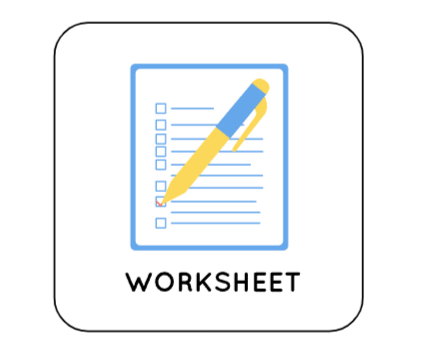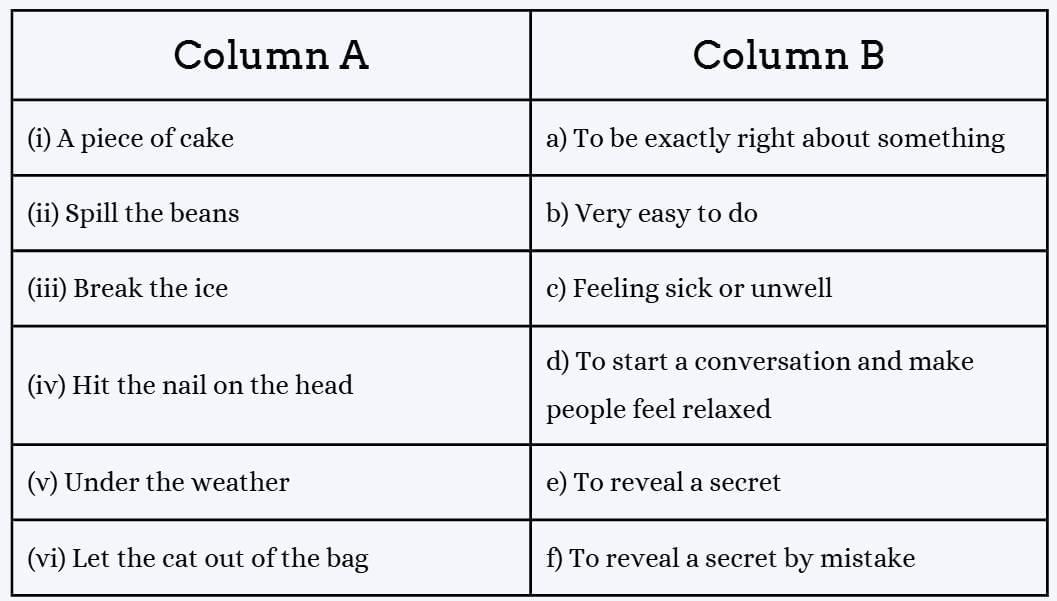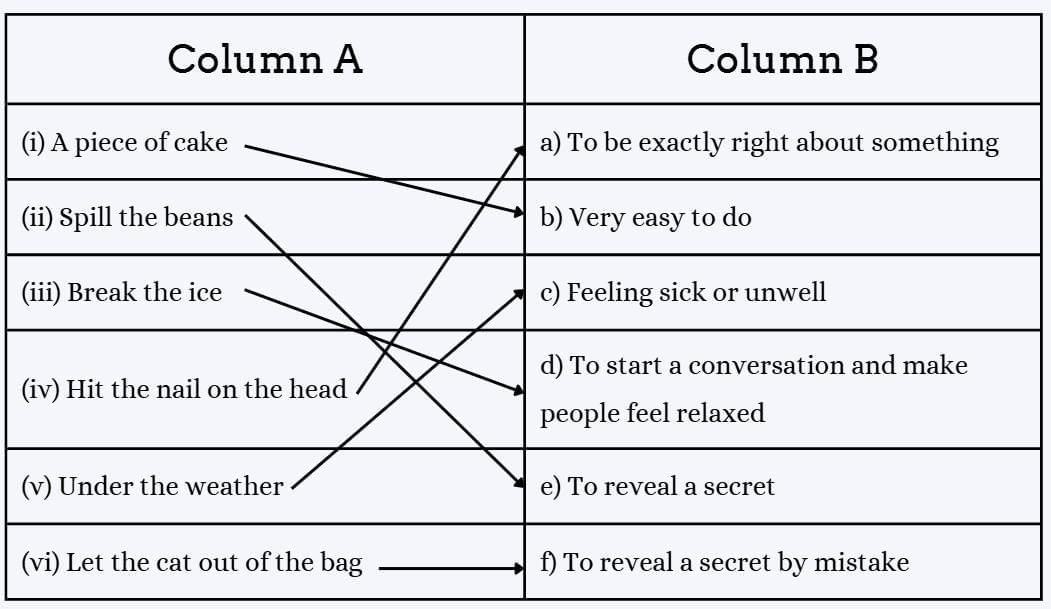Worksheet Solutions: Idioms and Phrases | English Grammar for Class 6 PDF Download

Q1: Multiple Choice Questions (MCQs) on Idioms and Phrases
(i) What does the idiom "a piece of cake" mean?
(a) Something very easy
(b) A slice of cake
(c) A difficult task
(d) A type of dessert
Ans. (a) Something very easy
Explanation: The idiom "a piece of cake" is used to describe something that is very easy to do.
(ii) What does the idiom "hit the sack" mean?
(a) To go shopping
(b) To go to bed
(c) To punch a bag
(d) To eat a snack
Ans. (b) To go to bed
Explanation: The idiom "hit the sack" means to go to bed or go to sleep.
(iii) What does the idiom "break the ice" mean?
(a) To start a conversation
(b) To smash ice
(c) To freeze water
(d) To begin winter
Ans. (a) To start a conversation
Explanation: The idiom "break the ice" means to start a conversation or create a relaxed atmosphere.
(iv) What does the idiom "spill the beans" mean?
(a) To make a mess
(b) To reveal a secret
(c) To cook beans
(d) To trip over
And. (b) To reveal a secret
Explanation: The idiom "spill the beans" means to reveal a secret or disclose something that was meant to be kept hidden.
(v): What does the idiom "under the weather" mean?
(a) Feeling sick
(b) Checking the weather
(c) Being outside
(d) Enjoying the rain
Ans. (a) Feeling sick
Explanation: The idiom "under the weather" means to feel unwell or sick.

Q2: Match the idioms in Column A with their meanings in Column B. Write the correct letter of the meaning next to each idiom.
Ans.

Q3: Fill in the blanks using the correct idioms from this box:
(cost an arm and a leg, bite off more than you can chew, burn the midnight oil, the ball is in your court)
(i) This new bicycle costs an arm and a leg; my parents spent a lot of money on it.
(ii) Don’t bite off more than you can chew by trying to do too many tasks at the same time.
(iii) I had to burn the midnight oil last night to finish my homework.
(iv) I have told you everything; now the ball is in your court to decide what to do next.
Q4: Choose the correct idiom or phrase and complete each sentence.
(i) [Let the cat out of the bag / Bite off more than you can chew] - She let the cat out of the bag, the secret about the surprise.
(ii) [On the table / In the car] - I left my lunch in the car.
(iii) [Break the ice / Burn the midnight oil] - To start the class smoothly, the teacher told a funny story to break the ice.
(iv) [Cost an arm and a leg / Under the weather] - His new laptop was very expensive; it cost an arm and a leg.
(v) [At the park / Next to the door] - We will meet you at the park after school.
Q5: Write the meaning of each idiom or phrase, then make your own sentence.
(i) Spill the beans
Meaning: To tell a secret.
Sentence: I accidentally spilt the beans about the surprise party.
(ii) Break the ice
Meaning: To start a conversation or activity so everyone feels comfortable.
Sentence: The teacher told a joke to break the ice on the first day.
(iii) Let the cat out of the bag
Meaning: To reveal a secret by mistake.
Sentence: She let the cat out of the bag about the birthday gift.
(iv) Cost an arm and a leg
Meaning: Something very expensive.
Sentence: That new video game cost an arm and a leg!
Q6: State Yes if the statements are correct and NO if not correct.
(i) "She let the cat out of the bag by telling everyone about the surprise party."
A) Yes
B) No
Ans. A) Yes
"Let the cat out of the bag" means to reveal a secret, so this usage is correct.
(ii) "The new student was a dark horse in the class, always drawing attention."
A) Yes
B) No
Ans. B) No
"Dark horse" means someone who unexpectedly achieves success, not someone who draws attention.
(iii) "When they lost the match, they had to bite the bullet and accept defeat."
A) Yes
B) No
Ans. A) Yes
"Bite the bullet" means to endure a painful or difficult situation, so this usage is correct.
(iv) "He missed the deadline, so now he has to face the music."
A) Yes
B) No
Ans. A) Yes
"Face the music" means to accept the consequences of one's actions, so this usage is correct.
|
49 videos|349 docs|46 tests
|
FAQs on Worksheet Solutions: Idioms and Phrases - English Grammar for Class 6
| 1. What is the purpose of using idioms in sentences? |  |
| 2. How can using idioms enhance the quality of writing? |  |
| 3. Can using idioms help in improving language skills? |  |
| 4. Are idioms commonly used in everyday conversations? |  |
| 5. How can one effectively incorporate idioms into their writing? |  |





















